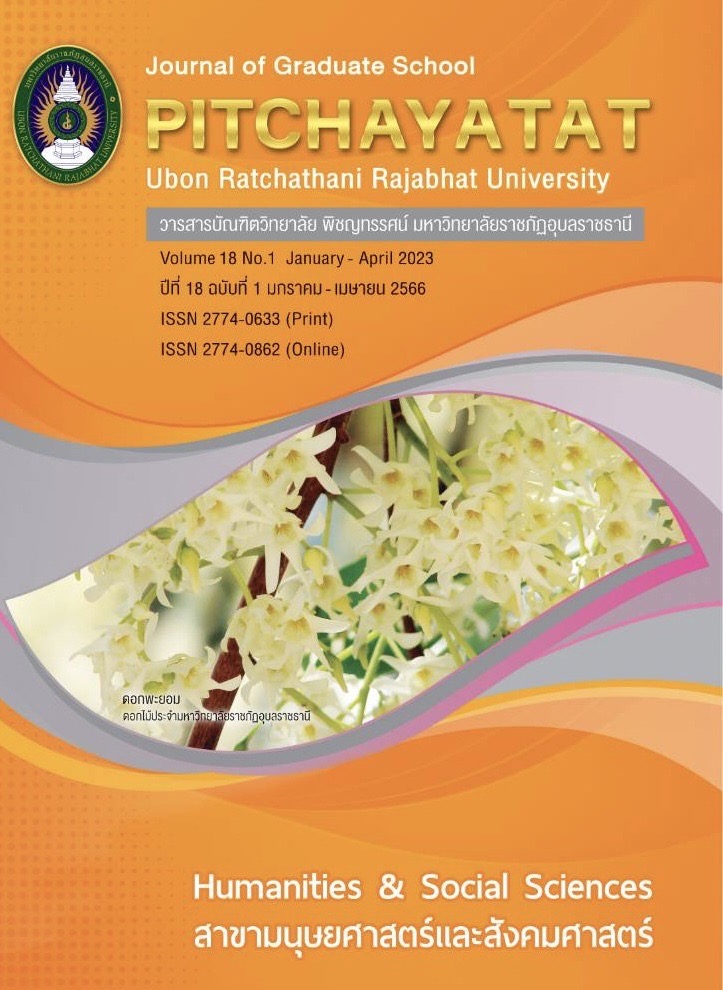การพัฒนาทักษะการคิดวิเคราะห์ โดยใช้กระบวนการเรียนรู้แบบ 5 ขั้นตอน ผสมผสานผ่านเพลง สำหรับนักเรียน สังกัดสำนักงานเขตพื้นที่การศึกษามัธยมศึกษาพระนครศรีอยุธยา
คำสำคัญ:
ทักษะการคิดวิเคราะห์, กระบวนการเรียนรู้แบบ 5 ขั้นตอน, เพลงบทคัดย่อ
การวิจัยนี้มีวัตถุประสงค์เพื่อ 1) เปรียบเทียบทักษะการคิดวิเคราะห์ หลังเรียน ของกลุ่มที่เรียนโดยที่ใช้กระบวนการเรียนรู้แบบ 5 ขั้นตอน ผสมผสานผ่านเพลง กับกลุ่มที่ใช้กระบวนการเรียนรู้แบบปกติ สำหรับนักเรียนสังกัดสำนักงาน เขตพื้นที่การศึกษามัธยมศึกษาพระนครศรีอยุธยา 2) เปรียบเทียบผลสัมฤทธิ์ทางการเรียน หลังเรียน ของกลุ่มโดยที่ใช้กระบวนการเรียนรู้แบบ 5 ขั้นตอน ผสมผสานผ่านเพลง กับกลุ่มที่ใช้กระบวนการเรียนรู้แบบปกติ สำหรับนักเรียน สังกัดสำนักงานเขตพื้นที่การศึกษามัธยมศึกษาพระนครศรีอยุธยา ตัวอย่าง คือ นักเรียนระดับชั้นมัธยมศึกษาปีที่ 3 โรงเรียนบางปะอิน “ราชานุเคราะห์ ๑” จังหวัดพระนครศรีอยุธยา แบ่งเป็นกลุ่มทดลองและกลุ่มควบคุม รวมทั้งสิ้น 60 คน ได้มาด้วยวิธีการสุ่มแบบหลายขั้นตอน เครื่องมือที่ใช้ ได้แก่ 1) แผนการจัดการเรียนรู้วิชา ภาษาไทย โดยใช้กระบวนการเรียนรู้แบบ 5 ขั้นตอน ผสมผสานผ่านเพลง 2) แบบทดสอบวัดผลสัมฤทธิ์ ทางการเรียน 3) แบบประเมินทักษะการคิดวิเคราะห์ สถิติที่ใช้ ได้แก่ ร้อยละ ค่าเฉลี่ย ส่วนเบี่ยงเบนมาตรฐาน และการทดสอบที แบบกลุ่มสัมพันธ์
ผลการวิจัยพบว่า
- คะแนนทักษะการคิดวิเคราะห์ ของกลุ่มที่ใช้กระบวนการเรียนรู้แบบ 5 ขั้นตอน ผสมผสานผ่านเพลง หลังเรียน สูงกว่ากลุ่มที่ใช้กระบวนการเรียนรู้แบบปกติอย่างมีนัยสำคัญทางสถิติที่ระดับ .05 และคะแนนผลสัมฤทธิ์ทางการเรียนของกลุ่มที่ใช้กระบวนการเรียนรู้แบบ 5 ขั้นตอน ผสมผสานผ่านเพลงหลังเรียน สูงกว่าก่อนเรียน อย่างมีนัยสำคัญทางสถิติที่ระดับ .05
- คะแนนผลสัมฤทธิ์ทางการเรียน ของกลุ่มที่ใช้กระบวนการเรียนรู้แบบ 5 ขั้นตอน ผสมผสานผ่านเพลง หลังเรียน สูงกว่ากลุ่มที่ใช้กระบวนการเรียนรู้แบบปกติ อย่างมีนัยสำคัญทางสถิติที่ระดับ .05 และคะแนนผลสัมฤทธิ์ทางการเรียนของกลุ่มที่ใช้กระบวนการเรียนรู้แบบ 5 ขั้นตอน ผสมผสานผ่านเพลง หลังเรียน สูงกว่า ก่อนเรียนอย่างมีนัยสำคัญทางสถิติ ที่ระดับ .05
เอกสารอ้างอิง
เขตพื้นที่การศึกษามัธยมศึกษาพระนครศรีอยุธยา, สำนักงาน. ผลการประเมินทักษะการคิดวิเคราะห์ของสำนักงานเขตพื้นที่การศึกษามัธยมศึกษาพระนครศรีอยุธยา. พระนครศรีอยุธยา: สำนักงาน, 2564.
นวภัทร สมานพันธ์ และ สิทธิพล อาจอินทร์. “การพัฒนากิจกรรมการเรียนรู้โดยใช้กลวิธีการอ่านแบบร่วมมือและเพลงเพื่อพัฒนาผลสัมฤทธิ์ทางการเรียน กลุ่มสาระการเรียนรู้ภาษาไทยของนักเรียนชั้นประถมศึกษาปีที่ 3,” ศึกษาศาสตร์ มหาวิทยาลัยขอนแก่น. 35, 3 (กรกฎคม-กันยายน 2555): 23-30.
บุญชม ศรีสะอาด. การวิจัยเบื้องต้น. พิมพ์ครั้งที่ 10. กรุงเทพ ฯ: สุวีริยาสาส์น, 2560.
ศรีบังอร จุ้ยศิริ. การเปรียบเทียบผลสัมฤทธิ์ทางการเรียนและความสนใจในวิชาภาษาไทยของนักเรียนชั้น มัธยมศึกษาปีที่ 3 ที่เรียนวรรณคดีไทยโดยใช้เพลงประกอบการสอนกับการสอนปกติ. วิทยานิพนธ์การศึกษามหาบัณฑิต มหาวิทยาลัยศรีนครินทรวิโรฒ, 2550.
สุมณฑา ศักดิ์ชัยสมบูรณ์. “ความสำคัญของเพลงในการสอนภาษาไทยให้ชาวต่างชาติ,” มนุษยศาสตร์ และสังคมศาสตร์ มหาวิทยาลัยราชภัฏบ้านสมเด็จเจ้าพระยาปีที่. 16, 1 (มกราคม-มิถุนายน 2565): 86-124.
อภิญญา ศรีสุข. ผลการจัดการเรียนรู้แบบ 5E ที่ดัดแปลงร่วมกับเทคนิคการจัดการเรียนรู้เชิงรุกที่มีต่อทักษะการคิดขั้นสูงและแรงจูงใจในการเรียนของนักเรียนชั้นมัธยมศึกษาปีที่ 1. วิทยานิพนธ์การศึกษามหาบัณฑิต มหาวิทยาลัยศรีนคริทรวิโรฒ, 2562.
Griffee, D. Songs in action. Hertfordshire. Phoenix ELT, 1992.
ดาวน์โหลด
เผยแพร่แล้ว
รูปแบบการอ้างอิง
ฉบับ
ประเภทบทความ
สัญญาอนุญาต
ลิขสิทธิ์ (c) 2023 วารสารบัณฑิตวิทยาลัย พิชญทรรศน์ มหาวิทยาลัยราชภัฏอุบลราชธานี

อนุญาตภายใต้เงื่อนไข Creative Commons Attribution-NonCommercial-NoDerivatives 4.0 International License.
บทความทุกเรื่องได้รับการตรวจความถูกต้องทางวิชาการโดยผู้ทรงคุณวุฒิภายนอกอย่างน้อย 3 คน ความคิดเห็นในวารสารพิชญทรรศน์เป็นความคิดเห็นของผู้นิพนธ์มิใช่ความคิดเห็นของผู้จัดทำ จึงมิใช่ความรับผิดชอบของวารสารพิชญทรรศน์ และบทความในวารสารพิชญทรรศน์สงวนสิทธิ์ตามกฎหมายไทย การจะนำไปเผยแพร่ต้องได้รับอนุญาตเป็นลายลักษณ์อักษรจากกองบรรณาธิการ





